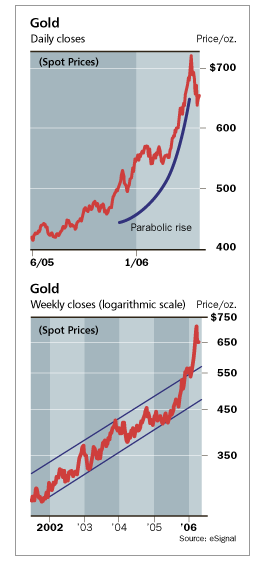

|
| weblog/wEssays archives | home | |
|
Is Getting Rich Really This Easy? (June 7, 2006)  You know the end of a speculative run is near when major media covers blare "you can't lose."
The latest Barron's cover provides not one but two shining examples of this:
"If Gold Slips to $600, Buy It!" (note the exclamation point) and "Time to Buy Commodities?" (the giddy guy on the
cover who has made a fortune in commodities is your answer: yes, a resounding yes, many times over!)
You know the end of a speculative run is near when major media covers blare "you can't lose."
The latest Barron's cover provides not one but two shining examples of this:
"If Gold Slips to $600, Buy It!" (note the exclamation point) and "Time to Buy Commodities?" (the giddy guy on the
cover who has made a fortune in commodities is your answer: yes, a resounding yes, many times over!)
Is it really this easy to get rich? Just buy the hot stock or sector when everyone else is buying it, too? Sadly, if it were this easy, we'd all be millionaires. But instead of all being millionaires, most of us are poor dumb morons like myself whose forays as an "investor" (a polite term for gambling of the most speculative, pernicious sort) have generally ended in resounding disaster. Does the "sure thing" furor bubbling around gold and commodities remind anyone else of all those recommendations to buy Cisco at $80? It was all so obvious (as you might recall); the Internet was a revolutionary force which would blossom in a decades-long boom, and therefore the Internet companies would grow like Topsy, too. Skeptics were dismissed as fools or Luddites, and the proof they were wrong was simple: the stocks kept going up. Alas, the business cycle was not so easily thrown over. Small details, such as Amazon being worth far more than justified even if they sold every book in the world, eventually surfaced; gamblers (oops, I mean "investors") realized that a $10 million company could double sales every quarter for quite some time, but a $5 billion company could no longer do so. Yes, the Internet was a revolutionary force, and would grow for decades; but that did not automatically translate into Cisco being a buy at $80 (just before it fell to $10). Now the same language is being applied to China and commodities in a similarly euphoric, can't-lose manner. The voracious appetite of the growing Chinese economy knows no bounds, the rising Chinese middle-class wants more meat, hence feedstock grains are a sure bet, the Chinese must build out the infrastructure of their vast nation so their demand for steel, copper, coal, oil and indeed, soybeans, must grow for decades to come. This is the usual development of a new industry or field: the initial leg of growth is rapid as the low-hanging fruit is scooped up and new markets or processes are exploited. But at some point the easy money has been made; competition heats up, production capacity expands and demand falls to a less torrid growth rate (or perhaps even falls). Prices which rose most happily during rapid expansion level off and then begin to fall as price points are reached and production exceeds demand; margins fall, weaker players drop out or go bankrupt, and a long re-trenching begins.  Those giddy souls who are so sure that China is on a never-ending growth binge would be
wise to look at the 1997-98 era in China a bit closer. Yes, Virginia, the business cycle
exists even in China. Consider these examples I saw with my own eyes: On the outskirts of
Suzhou, China, a derelict half-built highrise sat vacant and decaying for years; the project,
begun in the late 90s, went bust. It remained a towering eyesore, a reminder that excesses
can and will abruptly cease, for many years. It was finally taken up in this current real
estate bubble and completed as a luxury hotel this past year. (There were plenty of empty
factories in 2000 as well.)
Those giddy souls who are so sure that China is on a never-ending growth binge would be
wise to look at the 1997-98 era in China a bit closer. Yes, Virginia, the business cycle
exists even in China. Consider these examples I saw with my own eyes: On the outskirts of
Suzhou, China, a derelict half-built highrise sat vacant and decaying for years; the project,
begun in the late 90s, went bust. It remained a towering eyesore, a reminder that excesses
can and will abruptly cease, for many years. It was finally taken up in this current real
estate bubble and completed as a luxury hotel this past year. (There were plenty of empty
factories in 2000 as well.)
Consider this question: if the global economy slips into recession as a result of the global housing bubble popping, won't the "world's workshop" likewise slip into recession? How could China not follow suit? The glib answer of the cheerleaders is that domestic demand will keep China humming; but as I have noted here many times, the domestic market for goods such as autos, luxury apartments, and TV sets has already been slaked; the Chinese economy has already reached the stage of over-capacity and price reductions. There are other limitations on limitless growth in China--number one of which is the environmental carrying capacity of its land. Astute reader Albert T. was kind enough to foreward this story on China's water woes: "In the area where Beijing and Tianjin are located there are some cities which in five to seven years will run out of water. We're talking about a time bomb and one day it will be too late to go back." In a similar fashion, the story for gold is "can't lose": the dollar will continue to weaken, ETFs (exchange traded funds) will be buyers of physical gold for years to come, the Indians and Chinese are big buyers of gold, etc. All of this begs the simple question: won't gold respond to a recession like any other product or service, that is, a slackening of demand as money gets tight? And won't that slackening of demand have an effect on the price? If only it were that easy to get rich: just follow the herd. Although I am a complete moron, even I can see that the time to have bought gold was when it was out of favor, circa 1999-2000. Now, as it is most assuredly in widespread, even euphoric favor, is generally the time to sell out and move to another backwater of forgotten value which has fallen into disfavor. The herd always seems to be gathering new blood and new speed just before it runs off a cliff. For more on this subject and a wide array of other topics, please visit my weblog. copyright © 2006 Charles Hugh Smith. All rights reserved in all media. I would be honored if you linked this wEssay to your site, or printed a copy for your own use. |
||
| weblog/wEssays | home |